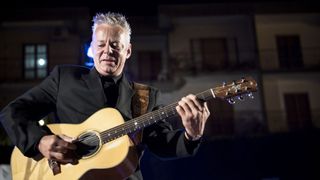Tommy Emmanuel's 8 tips for guitarists
Essential ideas from a master musician

Introduction
He’s one of the most gifted guitarists on Earth and one of only five people to earn Chet Atkins’ ‘Certified Guitar Player’ title. But Australian acoustic wizard Tommy Emmanuel says forget flashy technique, it’s all about the emotion.
Tommy Emmanuel is one of those rare pickers who can dazzle you, seemingly effortlessly, when he plays guitar.
He’s one of the most dextrous players in the world, but Tommy insists the stories and emotions that are the soul of music must be a guitarist’s first priority
Aside from being a great entertainer and showman, he’s also the guy you wish you could be when someone passes a guitar round the campfire; the guy who knows a seemingly endless supply of beautiful songs by heart and plays them with astonishing technical flair and flourish.
And although he’s undoubtedly one of the most dextrous players in the world, Tommy insists the stories and emotions that are the soul of music must be a guitarist’s first priority, otherwise your technique is talking loud but saying nothing.
Here, we join Tommy to find out what abilities he thinks matters most when it comes to playing guitar well, and what you should focus on in order to connect with your audience on a musical level.
Don't Miss

Early Experience Is Important
“I got my first guitar when I was four and my mother showed me D, G and A7 and then she sang the song Little Green Valley.
My mother taught me right from the beginning to see the big picture
“She said, ‘You count these bars,’ and she showed me how a song was constructed: here’s the introduction, here’s the first verse, here’s the second verse; it’s the same pattern as the first verse then the chorus goes like this and you piece it together and there’s the song. And she taught me right from the beginning to see the big picture, to see the whole song right.”

Learn What Makes Songs Tick
“My mum started playing music with other local guitar players who would come by and they would sit and play and I would sit at their feet and look up and watch and know that’s what I wanted to do.
I wasn’t really interested in anything else and it was the same for my brother, Phil
“I wasn’t really interested in anything else and it was the same for my brother, Phil. We would hear a song on the radio like Marty Robbins’ El Paso or something like that and my brother would go, ‘That’s E, F# minor, B, E and same thing again, then the bridge goes A back to E…’ and he was like a computer! He’d be spitting the chords out and saying what they were and in five minutes, we had an arrangement and he played the melody and I played the backing.”

Aim To Evoke Emotion
“Guitar players in general are fascinated by what is possible on this instrument and just the basic fact that I play and you feel good is an incredible thing in itself.
So the better I get at it, the better I’m in tune with what I know touches people
“I play and something happens to you! Wow, what a concept. So the better I get at it, the better I’m in tune with what I know touches people. And so I try to think in that way: if it really moves me, I think it’s going to move you, and if I get it, I think you’ll get it. Because I’m a real simple guy: I wanna hear the melody, I wanna be told a story, I wanna be taken somewhere.”

Guitars Are Storytelling Tools
“I first heard Django Reinhardt when I was 16 and I was touring. I was way out in the middle of nowhere and I found a Django record and I’d heard all about him.
[A lot of people are] ‘doing the guitar’, rather than using the instrument as their tool to tell you something
“But when I put it on, I just didn’t get it. It sounded stupid to me - it sounded like circus music. And I thought, ‘What’s the big deal about this guy?’
“And it wasn’t until I’d grown up a bit more and I went back and listened and I went, ‘Oh, God, this is unbelievable!’ So I think there’s a lot of people out there at that stage. First of all, they’re not as good as they think they are and they don’t have a handle on telling a story using their music. They’re actually just playing the instrument. They’re ‘doing the guitar’, rather than using the instrument as their tool to tell you something.”

Technique Is Not Enough
“Some people will settle for mediocrity: here’s a bunch of chords and I’m going to do a few tapping things, hit some harmonics, play some groove and that’s going to really impress people.
I don’t want to watch you in the gym, I want an emotional experience
“And it does. It does impress some people - but it doesn’t impress me if they’re not telling me something. It’s like, ‘I don’t want to watch you in the gym, I want an emotional experience when someone plays an instrument.’ It’s really all about: how good is the song and what does it say?”

Practise Hard, Play Easy
“I think you should take your time and do things properly. Don’t skim over it because you want to get to the bit where you’re impressing people, playing this song in front of them.
Learn the thing properly, start out slowly. Use a metronome
“Learn the thing properly, start out slowly. Use a metronome. I absolutely come back to this - it’s the best way to do it that I know, to get this thing right. Learn the melody right, practise it a million times, practise with a metronome then start playing it in front of people.”

Be Immersed In Performance
“A guy wrote to me on Facebook and he said, ‘What do you think of when you are playing a song?’ And I said, ‘All my attention is on the melody.
I guess the underlying message is, there are no short cuts
“‘I want the melody to tell a story and to have a life of its own. I know the song works because I meticulously put it together right, but when I play the song, now I’ve practised it enough, I don’t have to focus on all these moves and all I have to focus on is the melody. Can I play the melody as if I was singing it?’
“I guess the underlying message is, there are no short cuts. You’ve got to do things properly if you want to play the music with all the feeling you can put into it.”

Follow Your Instincts
“Chet [Atkins] used to talk to me about the mystery of the guitar, the secrets within the fretboard and how do we unlock all these mysteries, and he was so fascinated by it in exactly the same way.
Lucky for me, people like what I do and I only do it
“He just grew up in a different generation and a different time, but it’s the same thing, I think. I think I’m just a guy who is fulfilling what nature intended for him somehow and, lucky for me, people like what I do and I only do it.”
The tour-de-force instrumental album, It’s Never Too Late, by Tommy Emmanuel, is available now on Thirty Tigers.
Don't Miss
Most Popular










